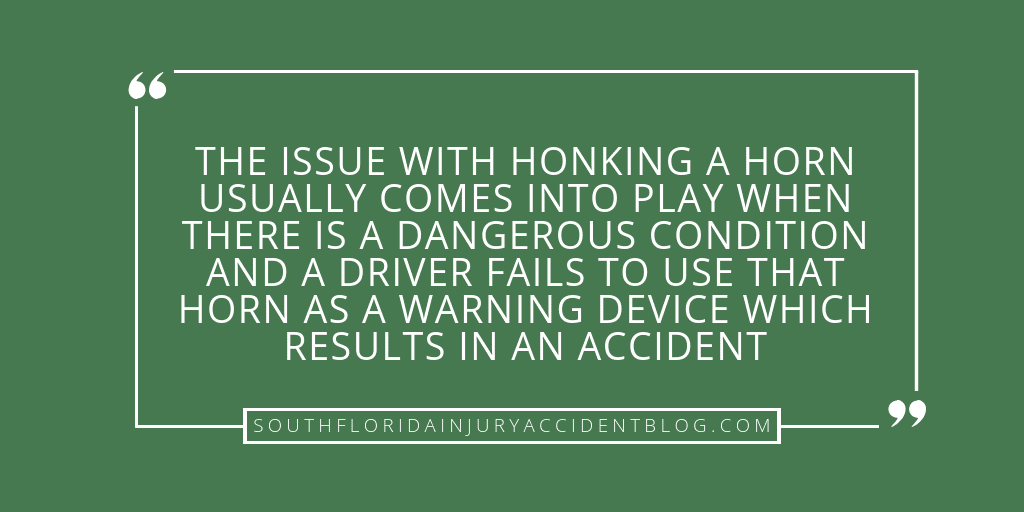Last Update: 01/13/16
Having a horn on your car, truck, SUV, minivan, or motorcycle is pretty much taken for granted. However, horns are a serious component for motor vehicle safety especially when you need to warn another car, or pedestrian, bicyclist, or motorcyclist of danger. Honking your horn is an automatic reaction for most drivers; you hit that horn and sound a loud warning.
Is There a Florida Statute Related to Motor Vehicle Horns?
Yes, the Florida Legislature passed a law that requires horns on moving vehicles in Florida. Florida Statute 316.271 requires the following:
1. All motor vehicles that drive on a Florida highway must have a horn in good working order.
2. The horn must be loud enough to be heard from a distance of 200 feet or more. (Emergency sirens, by contrast, are to be heard from as far as 500 feet or more.)
Horns cannot be tricked-out to give off strange and bizarre sounds — that warning honk from a horn must be readily recognized by the public in order to successfully warn people immediately of danger. It’s illegal to change a car horn so it has a unique whistle or plays a part of a favorite song.
Car Horn Sounds
Click below to hear the sound of a car horn that Florida law enforcement might not appreciate. (You may recognize this as the Dixie Car Horn from the old TV show, “The Dukes of Hazzard.”)
A driver who violates Florida Statute 316.271 is considered to have violated Florida law in the form of a non-criminal traffic violation and can be ticketed for a non-moving violation under Florida traffic laws (Florida Motor Vehicle Code Chapter 318).
Too Much Honking vs. Too Little Honking
1. Overuse of Car Horn
Here in the Miami – Fort Lauderdale area, people are notorious for using their horns in traffic. We are drivers who like to hit that horn, particularly when traffic is moving slowly on the interstate. It’s usually not a problem, but it can be an annoyance to some. See, “Florida state law on horn honking: Local 10 viewers say the sound of honking horns is driving them crazy!”
Additionally, laying on your horn when you’re frustrated can be interpreted as evidence of road rage. In Florida, that’s frowned upon by traffic officers.
However, there are situations where the hitting of a car horn inappropriately actually CAUSES an accident. The sudden loud and long honk of a horn can startle other drivers who may be distracted from their driving enough to:
- Become afraid or flustered and slam into other vehicles;
- veer from their lane and hit a curb, which causes them to lose control and crash; or
- brake suddenly in response to danger resulting in a rear-end collision.
2. Failure to Warn with Car Horn
From a personal injury perspective, the issue with honking a horn usually comes into play when there is a dangerous condition and a driver fails to use that horn as a warning device which results in an accident and a serious injury to innocent victims. Horns are required by law because they are effective warning devices. Horns are safety devices first and foremost.
If a driver fails to use their horn to warn others of danger then they can be guilty of failure to warn. Examples include:
- A driver loses control of his car on a slippery, wet roadway and doesn’t immediately honk to warn vehicles around him;
- A driver does not tap his horn to warn a driver on the highway that they are about to move into his lane (letting the other driver know you’re there);
- A driver fails to honk when a parked car is about to move into their car’s path;
- A driver doesn’t hit their horn when a pedestrian (child, teenager, elder) is about to walk or run right into their lane of traffic.

Car Horns and Car Crash Claims
If you are injured in a motor vehicle accident, then it may be difficult to prove that the accident was caused, at least in part, by the failure of a driver to signal danger with their horn. In these situations, witnesses to the crash may be invaluable because it is usually much easier for a person to remember the failure of a horn signal (”Did you hear a horn honking?” “No, I don’t think I did.”) than other crash circumstances.
One reason for this is that car horns sound MUCH LOUDER outside your vehicle than they do when you are inside the car’s interior, hitting that car horn.
Failure to warn is a basis for a negligence claim and an argument for damages to be paid to an accident victim. An experienced personal injury lawyer will know the importance of asking questions regarding things like “did anyone hear a horn honking just before the crash?”
Insurance companies and insurance adjusters may belittle the fact that the victim didn’t hear a horn honking — but a car crash lawyer will be the first to point out that all too often, that failure to warn means the difference between a near-miss and an actual collision.
What Should You Do Now?
A good piece of advice if you have been harmed in an accident, is to at least speak with an experienced personal injury lawyer before you file a claim to learn about some of the issues that can arise with these claims, including the type of evidence needed to prove a claim and the type and amount of damages you can recover. Most personal injury lawyers, like Alan Sackrin, will offer a free initial consultation (over the phone or in person) to answer your questions.
Related:
_______________
 Do you have questions or comments? Then please feel free to send Alan an email or call him now at (954) 458-8655.
Do you have questions or comments? Then please feel free to send Alan an email or call him now at (954) 458-8655.
